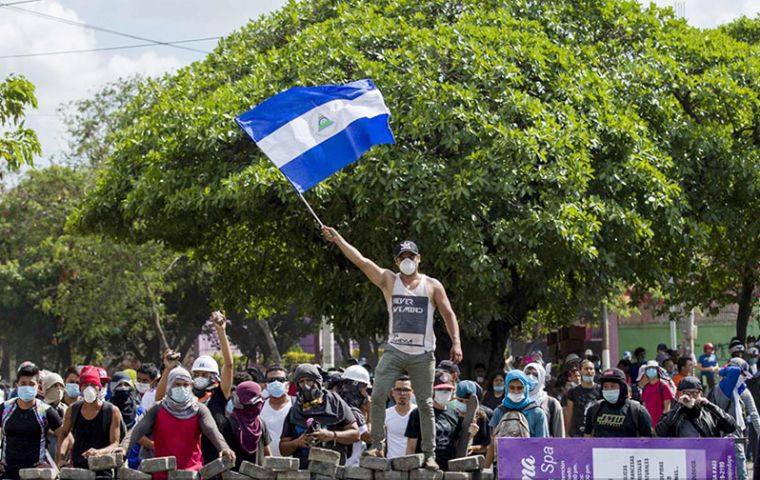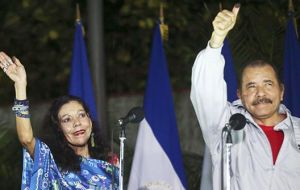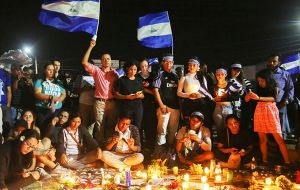MercoPress. South Atlantic News Agency
Nicaragua's husband-wife team ready to fall: end of the road for the Ortegas
 The protests by now have left 90 people dead and almost a thousand injured. The great majority of victims are students, and others shot by the police
The protests by now have left 90 people dead and almost a thousand injured. The great majority of victims are students, and others shot by the police  The Ortega-Murillo family have large but ill-defined interests in TV stations, fuel companies, and the proposed trans-Nicaragua rival to the Panama Canal.
The Ortega-Murillo family have large but ill-defined interests in TV stations, fuel companies, and the proposed trans-Nicaragua rival to the Panama Canal.  Gangs linked to the ruling Sandinista party have killed people while the security forces stood back and did not intervene.
Gangs linked to the ruling Sandinista party have killed people while the security forces stood back and did not intervene. By Gwynne Dyer (*) - From the Ceausescus in Romania (overthrown and shot 1989) to the Mugabes (removed in a non-violent military coup 2017), husband-and-wife teams running authoritarian regimes seem to have a particularly high casualty rate. And now it may be the turn of the Nicaraguan team: President Daniel Ortega and his wife, Vice-President Rosario Murillo.
The protests that have convulsed Nicaragua for the past two months were initially triggered by a new five per cent tax on pensions and an equally modest increase in social security contributions. It was an ill-judged attempt to balance the books on a fairly generous welfare system, and the government quickly cancelled the changes once the demos started.
Yet the protests continued, and by now there are 90 people dead and almost a thousand injured. The great majority of the victims are students and others who have been shot by the police, or by gangs linked to the ruling Sandinista party that killed people while the security forces stood back and did not intervene.
It really is about the survival of the Ortega-Murillo regime now — and it is appropriate to call it that, although there are still more or less free elections in Nicaragua. Ortega is in his third consecutive term, having removed the two-term limit in the constitution, and the electoral law has been changed to let a presidential candidate win with as little as 35% of the vote (in a multi-candidate race).
Indeed, many Nicaraguans believe Ortega and his wife are in the process of founding a dynasty.
“She’s not the vice-president; she’s the co-president,” said Agustin Jarquin, who was once a close political ally of Ortega’s, and it’s true Murillo is more likely to make statements on government policy than Ortega himself.
Meanwhile, powerful opponents of the Ortega-Murillo family within the Sandinista party have been systematically weeded out of the government. The Supreme Court is stuffed with appointees loyal to the regime. And the Ortegas and their allies have large but ill-defined interests in TV stations, fuel companies, and the proposed trans-Nicaragua rival to the Panama Canal.
It’s a strange place for once-radical young revolutionaries like Ortega and Murillo to have ended up. They met in exile in Costa Rica when the ruthless Somoza regime still ruled Nicaragua, and rose to prominence together after the Sandinista revolution overthrew the Somozas in 1979.
They served the revolution loyally during the 1980s while the Reagan administration in Washington tried to destroy it using the CIA-backed Contra rebels in a war that killed 30,000 people. Ortega was even elected president in 1984, but then lost the 1990 election to a coalition of opposition parties.
He ran for president again in 1995 and in 2000, and lost to the more or less same conservative coalition both times. It was during this long spell in the wilderness that he gradually realized his more extreme ideas frightened a lot of people and began to tone them down. It may have been a purely tactical change at first, but if you say something often enough you may start to believe it.
By the time Ortega returned to power in the 2006 election, he was a changed man. No more Marxist rhetoric, and he was presenting himself as a devout Catholic. After having five children together, he and Murillo finally got married in 2005 in a Catholic church. And the truth is he won that election largely thanks to a deal with the powerful Catholic Church that banned abortion in Nicaragua.
He has won two more elections since then, and would now be classified as a man of the centre-left in most Western countries: pro-welfare state, but pro-capitalist too. Many leading figures in the Sandinista Party have made the same journey with him, and Murillo was probably already there.
Many hard-core Sandinistas are scandalized by these developments, but it’s a perfectly normal pattern in the aftermath of a revolution. Major advances in human rights may be preserved, but the ideology is steadily undermined by the stubborn realities of ordinary life. What is remarkable about Ortega and Murillo is that they have been able to work both sides of the street for so long.
The social welfare measures introduced by the Sandinistas in the 1980s survive, but Ortega and Murillo are far to the right of where they once were. The suspicion has grown that they are exploiting their political power to build their own business empire. The protests against them certainly have right-wing support, but it is left-wing students who dominate the demonstrations in the streets.
So the Ortegas have probably reached the end of the road. Nicaragua has not.
(*) Gwynne Dyers is a London-based independent Canadian journalist, syndicated columnist and military historian.




Top Comments
Disclaimer & comment rules-

Read all commentsO' Danny boy - the pipes, the pipes are calling - from Managua to Miami . . . .
Jun 03rd, 2018 - 02:40 pm 0Strange how the screw turns.
The poll is official open.
Dust off your crystal balls.
Ortega's fate is:
International NGO?
Prison?
Domestic veneration?
News commentary?
Bestselling author? Suggest possible titles if this is your choice.
Assassination?
Exile?
Poverty?
Riviera?
Cuba?
Venezuela?
Russia?
Commenting for this story is now closed.
If you have a Facebook account, become a fan and comment on our Facebook Page!